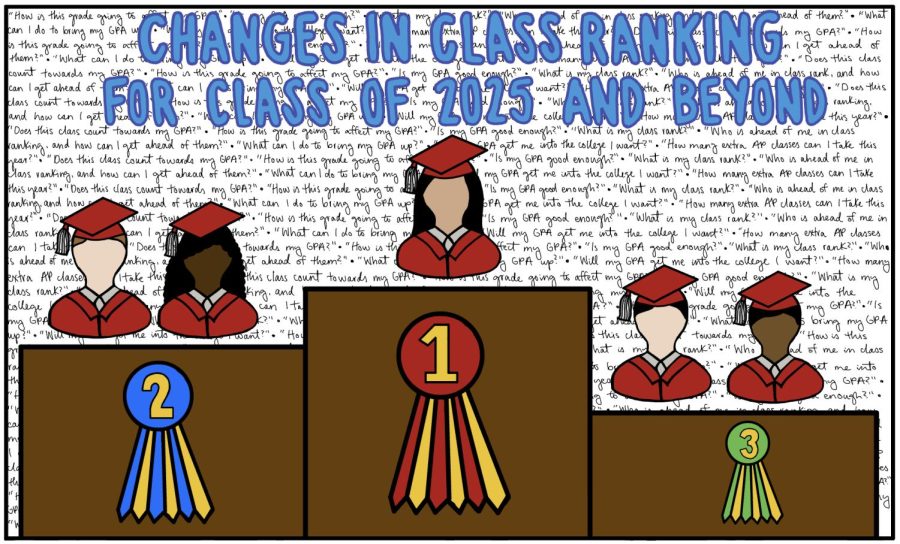District implements ranking changes in an effort to ease academic stress
Coppell ISD has implemented changes to the way the class of 2025 and beyond are being ranked. In the future only core classes and variations of them will count towards a student’s class ranking in hopes of reducing competitiveness. Graphic by Ava Johnson.
The mindset of GPA being the be-all and end-all is shared by many high school students and contributes to the competitive atmosphere in schools. It is natural to compare oneself to another, and students carry the weight of academic comparison throughout their high school and college years.
Coppell ISD faculty and administrators notice the negative effects of an intense competitive academic atmosphere on the mental health of students.
To foster a better learning environment, change is being implemented.
Beginning with the 2010-11 school year, Coppell High School ranked only the top 10% of students, with GPAs calculated for all courses that received state credit.
In 2021, CHS released its 2021-22 course guide, and one of the primary changes was that the classes of 2025 and beyond would be ranked on their scores in core classes, as well as variants of these core graduation credits (AP, International Baccalaureate, honors, distance learning courses, and credit earned by examination or without prior instruction), instead of in all courses receiving state credit.
Because of this change, the only courses that count towards a student’s GPA include English I- III, Algebra I-II, Geometry, the first credit of Biology, Chemistry, Physics, World History, U.S. History, U.S. Government, Economics, and the first two years of foreign language credit.
According to CHS lead counselor Ann Cinelli, the idea of changing the classes that count toward GPA began several years ago when CISD identified “redefining success” as one of their core values. Then CISD created a committee composed of teachers, administrators, principals and counselors from the middle schools, the high school, CHS9 and New Tech High @ Coppell. The committee met a few times to discuss and compare class ranking policies across different campuses and ultimately decided to change CISD’s ranking policy.
“So many of our students are just focused on [being ranked], because they want that automatic admission, so there’s like a prize at the end of it,” Cinelli said. “Getting into UT or A&M, or any Texas public school, is a big deal, and to not have to worry about the admission part, let alone if you’re number one, you get free tuition.”
This prize at the end of the tunnel only continues to fuel the vigorous competition among students for a high GPA and top class ranking. However, the accumulating academic stress takes its toll on students. In fact, 42 out of 50 students at CHS said that GPA comparison, as well as class ranking negatively impacts their mental health.
CHS sophomore Rudhmila Hoque said that GPA is a common way for students to achieve a brighter future and, as a result, creates a negative academic environment filled with stress and unattainable expectations.
Hoque said that she knows many other sophomores taking the same classes that juniors and seniors take. However, due to the ranking changes, they don’t receive credit for the classes, discouraging students from doing their best in those harder classes.
“It also creates stress for the people who screwed up in freshman year, and now they have sophomore and junior year and a few classes for both of them,” Hoque said. “So it’s not that good. In the end, it just makes you look really bad.”
The decision to change the ranking system for class of 2025 was made while the students were still in middle school as they entered the age to take classes that could count for high school level credit. Are we really doing what’s best for kids by putting pressure on them to perform and take as many AP classes in a year as they could? — CHS Principal Laura Springer
“They made this decision when those kids were in the sixth grade, just starting to take classes that had any kind of ranking with high school credit,” CHS Principal Laura Springer said. “It was really about mental health. We had kids at the time taking about six to seven AP classes, and you could just see the stress. They weren’t involved in some of our activities they wanted to be involved in.”
By implementing these changes to the class ranking system, quite a few impacts have been predicted.
“It puts a lot of weight on students in ninth and 10th grade, because those are the classes that are counting the most,” Cinelli said. “Even in middle school, when it comes to a student’s foreign language, math, sciences, those are done early on, versus English and social studies which continue on into senior year. ”
Aside from impacting both middle school and high school students, the changes in class ranking will likely result in more ties with GPA.
“Another big change is that we’re going to see a lot more kids tie for class rankings,” Cinelli said. “Because a lot of kids get similar grades in those classes, with a smaller subset of classes, you see that grades are the same, and then you get ties with GPA. The board tried to make it so that it was a little bit more of a level playing field, and so that more kids could have access to rank.”
Obviously, no two students can be ranked the same – Coppell’s new policy ingrains some of the old in order to decide those tiebreakers.
“The tiebreakers are determined by the school board,” Cinelli said. “They don’t actually sit down and do them, but they’ve determined what criteria it is. The tiebreaker comes down to the old class ranking rules. So, if you took AP classes that are not included in GPA, the GPA in those classes will count as part of the tiebreaker.”
According to Coppell ISD Board of Trustees president David Caviness, the district recognized the stress and pressure GPA put on students and the change was implemented in hopes of alleviating some of that stress.
Caviness said that the GPA changes were introduced in 2018 after a series of discussions between the administration, curriculum team and the board. Ultimately it came down to the board’s decision and all of the members unanimously agreed to implement the changes.
The changes to the class of 2025 GPA calculations has become a controversial topic among students at CHS, specifically among sophomores since they are the ones primarily affected by the decision.
Some learners such as CHS sophomore Fizza Shafiq agree with the board’s decision to approve the ranking changes proposed by the committee, believing that the decision ultimately benefits students.
“I feel like GPA ranking puts too much pressure on people, and then they don’t live their lives,” Shafiq said. “And then colleges look for extracurriculars and stuff and people who take GPA really seriously won’t do those things. Instead, they’ll take as many APs as they possibly can to increase their GPA. I think the change is more beneficial because people won’t be as stressed, and will have time to do more fun things, and people won’t resent school as much.”
However, others such as CHS sophomore Shreya Banerjee disagree with the decision, believing that the decision adds more stress to students, and that they
“Honestly, I don’t like it because, one, I feel like getting rid of all those AP elective courses that could have counted towards class rank is unfair,” Banerjee said. “Compared to the other ISDs that count [those classes] for class rank, in my perspective, it gives them a better chance at colleges, so I feel like it makes the playing field kind of uneven.”
Banerjee also thinks that the decision to implement new changes to class ranking leads to increased amounts of stress among students, as extra work put into electives no longer counts towards class rank.
“I would say [the change in class ranking] has a more negative effect because you’re having to constantly compare yourself and see a way to be better than other students so that you can have an advantage and stand out to colleges,” Banerjee said.
CISD hopes that its recent changes in how the class of 2025 and beyond will be ranked will reduce this stress and allow students to take more classes they’re genuinely interested in, rather than those that will only boost their GPA.
Follow Ava (@avakjohnson4) and @CHSCampusNews on Twitter

Ava is a senior and the sports assignment editor for The Sidekick. If she’s not working on a piece, you can find her reading, spending time with loved...








